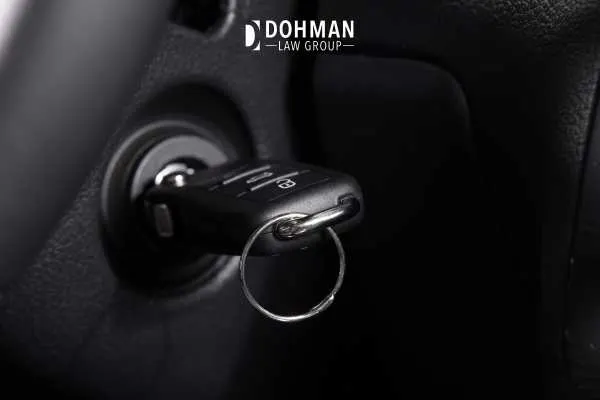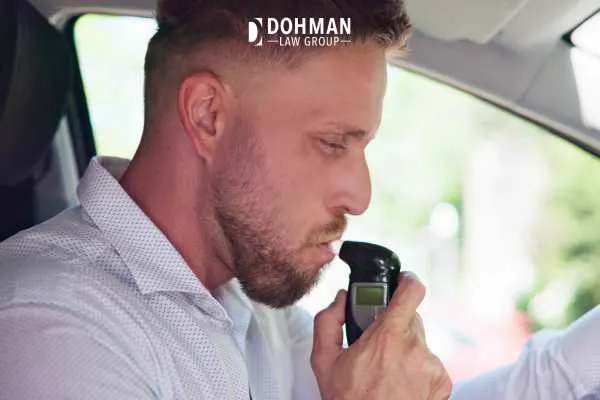If you fail a BAIID test, there are typically several consequences. A BAIID (Breath Alcohol Ignition Interlock Device) is an instrument that requires drivers to provide a breath sample before the vehicle’s ignition can be started. Failing a BAIID test means that you have registered a blood alcohol content (BAC) of .08 or higher and this result is usually reported to the court.
The consequences of failing a BAIID test can vary depending on the ignition interlock programs of the state in which you are driving. Generally, your vehicle will be impounded and you may face legal penalties such as fines, probation, community service, or jail time.
In some cases, the court may require you to enroll in an alcohol or drug treatment program if it is determined that you have a problem with substance abuse. If this is the case, then it is important to complete the program to have your license reinstated.
The consequences of failing a BAIID test are serious and can be quite damaging to your driving record and overall reputation. It is important to remember that drunk driving carries severe penalties, so it is best to avoid this behavior at all costs. Contact Dohman Law Group’s DUI defense attorneys if you have failed a BAIID test. Call us at (847) 359-4005 to schedule a consultation.
How Ignition Interlock Devices Work
An ignition interlock device (IID) is a breathalyzer installed in your vehicle that prevents you from starting the car if your blood alcohol content exceeds a certain level. This type of device is installed as part of DUI punishments or to ensure an individual’s sobriety if they have been previously convicted of operating a vehicle under the influence.
The IID is connected to the vehicle’s starter, ignition, and other electrical systems. When the driver attempts to start the car, they must provide an initial breath sample into the IID. If their BAC (blood alcohol concentration) is above a predetermined limit (usually 0.02%), then the device will not let them start the vehicle.

The IID also requires periodic breath tests while the car is in motion. If a driver fails any of these tests, then the IID will sound an alarm and record the incident. This data is usually sent to local law enforcement or the court that ordered the installation of the device.
Overall, failing a BAIID test can have far-reaching consequences, so it is best to always avoid drinking and driving. If you are required to use an IID as part of a court order, then you should follow all instructions and take the necessary steps to ensure your sobriety.
Why You Might Fail Your Ignition Interlock Device Test
If you have been ordered to install an ignition interlock device (IID) in your vehicle, it is important to understand why you might fail a breathalyzer test. An IID, also known as a BAIID (breath alcohol ignition interlock device) requires drivers to blow into the device before turning on their car. If the machine senses that your blood alcohol content (BAC) is over the predetermined limit, the car will not start.
The most common reason for failing a BAIID test is that you have been drinking alcohol and your BAC is above the legal limit. However, there are other reasons why you might fail an IID test even if you have not been consuming alcohol. These include using certain medications or medical conditions that can cause your breath to contain a higher level of alcohol than normal. Breathalyzers can also malfunction leading to false positive results.
If you fail a BAIID test, the consequences can vary depending on your state laws and the court that ordered the installation of the device. Generally, you may be required to pay fines, attend alcohol or drug treatment programs, or face jail time. Additionally, your license may be suspended for an extended period and you may be required to install a new IID in your vehicle.
Could You Lose Your Restricted License if You Fail a BAIID Test?
If you fail a BAIID test, it can have serious consequences. Depending on the state in which you live, your license could be suspended or revoked, or you could receive points against your driver’s license. Additionally, if you are convicted of driving with a BAIID and the device shows that you failed an IID test, you could lose your restricted license.
The type of penalty you receive for failing an IID test will depend on the laws in your state and the severity of the violation. Depending on the situation, you may be required to attend a hearing with the Department of Motor Vehicles (DMV) to determine if your license should be revoked or suspended. If you are found guilty, you could face additional fines, jail time, and/or mandatory installation of an IID in your vehicle.
Can a BAIID Test Failure Result in a Probation Violation?
Yes, failing an IID test can result in a probation violation. Depending on the specific terms of your probation, the consequences for failing an IID test may be different. Generally, if you fail an IID test, your probation officer will consider it a violation and could impose additional sanctions such as jail time or additional fines.

Failing an IID test means that you have violated your court order, so it is important to take this offense seriously and try to avoid any future violations.
What Happens if You Faily an IID More Than Once?
If you fail an ignition interlock device (IID) test more than once, the consequences can be severe. Depending on the laws in your state, if you fail an IID test more than once, it may be considered a misdemeanor or even a felony offense. Penalties could include jail time, fines, and the suspension of your license.
In some states, failing an IID test more than once may lead to the revocation of your restricted license and an order for you to install a new IID in your vehicle. Additionally, failing an IID test multiple times could result in additional probation violations and even jail time.
Can a DUI Lawyer Help if You Fail an IID?
A DUI lawyer from Dohman Law Group can be an invaluable assist if you fail a BAIID test. If you are convicted of driving under the influence, chances are that your license will be suspended or revoked and you will have to install an ignition interlock device (IID) in your vehicle as part of the court-ordered device program penalty. An IID is a device used for alcohol breath testing.
When you fail an IID test, it is important to take the situation seriously and to ensure that you do not make the same mistake twice. In some cases, this may mean hiring a DUI lawyer from Dohman Law Group who has experience dealing with these types of cases.
Their experienced DUI lawyers can provide you with legal advice and representation, helping you understand your rights and navigate the court system.


